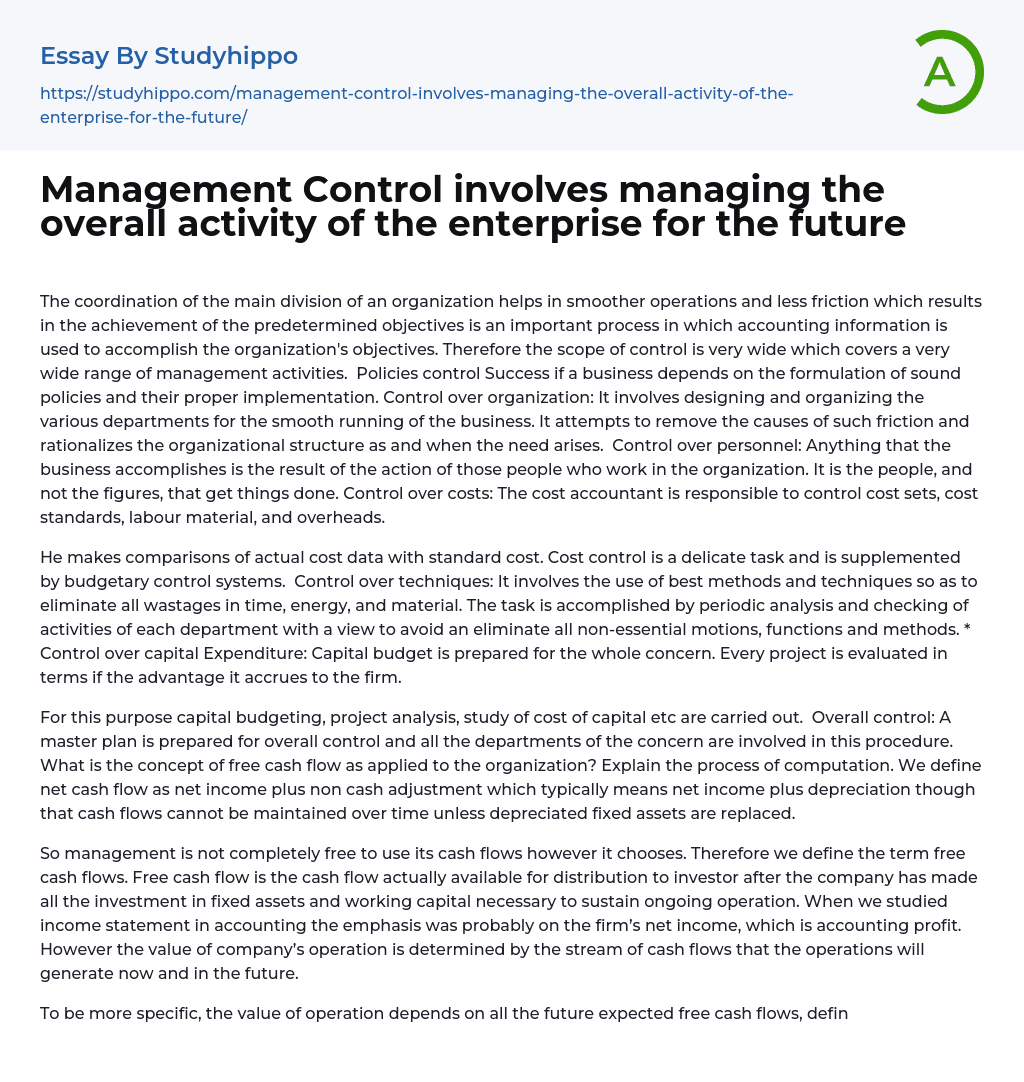

The Wide Scope of Control in Accounting for Organizational Objectives
The coordination of the main division of an organization is crucial for smooth operations and achieving predetermined objectives. This process utilizes accounting information to accomplish the organization's goals and has a wide scope that covers various management activities. Success is dependent on sound policy formulation and implementation. The control of the organization involves designing and organizing departments to ensure the business runs smoothly.
The organization aims to address the sources of friction and optimize the structure when necessary. Personnel control is crucial as the actions of employees drive business outcomes. The cost accountant oversees cost sets, standards, labor, materials, and overheads. They compare actual costs to standard costs, using budgetary control systems to enhance cost control. Techniques control involves utilizing efficient methods to eliminate waste in time, energy, and materials.
The task is achieved
...through regular analysis and monitoring of activities in each department to eliminate any unnecessary actions, functions, and methods. Control over capital expenditure is maintained by preparing a capital budget for the entire company. Each project is assessed based on the benefits it brings to the firm, using techniques such as capital budgeting, project analysis, and cost of capital evaluation. A comprehensive master plan is created for overall control, involving all departments of the organization. What is the definition of free cash flow in relation to the organization? Please describe the computation process.
Net cash flow is determined by adding net income and non-cash adjustments, which commonly includes depreciation. However, sustaining cash flows requires the replacement of depreciated fixed assets, limiting management's freedom to use the cash as desired. Consequently, we introduce the concept of free cash flows, which refers to the cash flow tha
can be distributed to investors after fulfilling all investments in fixed assets and working capital needed for ongoing operation. In accounting, the focus is typically on net income, which represents the firm's accounting profit.
In order to determine a company's operations value, the stream of cash flows generated currently and in the future must be considered. Specifically, the value depends on expected future free cash flows, calculated by subtracting after-tax operating profit from necessary investments in working capital and fixed assets. Consequently, managers can enhance their companies' worth by increasing free cash flow.
The uses of free cash flow encompass various actions such as paying interest to debt holders (while considering after-tax interest expense), repaying debt holders, distributing dividends to shareholders, repurchasing stock from shareholders, and investing in marketable securities or other non-operating assets.
Typically, companies combine these five uses differently to ensure that the net total aligns with free cash flow. For instance, a company may pay interest and dividends while also issuing new debts or selling some of its marketable securities.The mentioned activities can lead to either cash outflows (such as paying interest and dividends) or cash inflows (like issuing debt and selling marketable securities). Nevertheless, the total net cash flow from these activities will ultimately be equal to free cash flow. Free cash flow can be determined by calculating the after-tax operating profit (NOPAT) for a specific year.
If the company's NOPAT is $17.03 million and depreciation is the only noncash charge at $100 million, then its operating cash flow in 2001 would be the sum of NOPAT and any noncash adjustment on the statement of cash flows. Thus, the operating cash flow can be calculated
as NOPAT + depreciation (noncash adjustment) = $17.03 + $100 = $270.3 million. The company had $1,455 million in operating assets at the end of 2000 but this increased to $1,800 million at the end of 2001. Therefore, its net investment in operating assets is equal to $1,800 - $1,455 = $345 million. The Balanced Scorecard (BSC) is a performance management tool that measures if a company's operational activities align with its larger objectives and strategy in terms of vision. No information about implementation process or related difficulties is mentioned.
The Balanced Scorecard is a tool that goes beyond focusing solely on financial outcomes. It also considers operational, marketing, and developmental inputs to provide a more comprehensive view of a business. This approach helps organizations make decisions in their long-term interests. Instead of just measuring financial outputs, organizations are encouraged to assess the factors that influence those outputs, such as process performance, market share/penetration, and long-term learning and skills development. The reasoning behind this is that financial outcomes are "lag" measures that organizations cannot directly influence. Relying solely on financial measures for strategic control is considered unwise. Instead, organizations should also measure areas where management intervention is possible.
The text in the given paragraph is already unified and no is required.
- Professor essays
- Should College be Free essays
- Should college athletes be paid essays
- College Education essays
- College Tuition essays
- Graduation essays
- College Goals essays
- Personal Statement essays
- Online Classes Vs Traditional Classes essays
- Online Education essays
- Student Loan essays
- Study Abroad Scholarship essays
- Reasons To Go To College essays
- Paying College Athletes essays
- Technology In The Classroom essays
- Net Present Value essays
- Income Statement essays
- Classroom essays
- College essays
- E-Learning essays
- Elementary School essays
- Examination essays
- Graduate School essays
- High School essays
- History Of Education essays
- Homeschooling essays
- Kindergarten essays
- Middle School essays
- Public School essays
- School essays
- Single Sex Schools essays
- Special Education essays
- Student essays
- Teacher essays
- University essays
- Vocational Education essays
- Bank essays
- Banking essays
- Corporate Finance essays
- Credit Card essays
- Currency essays
- Debt essays
- Donation essays
- Enron Scandal essays
- Equity essays
- Financial Accounting essays
- Financial Crisis essays
- Financial News essays
- Financial Ratios essays
- Financial Services essays



